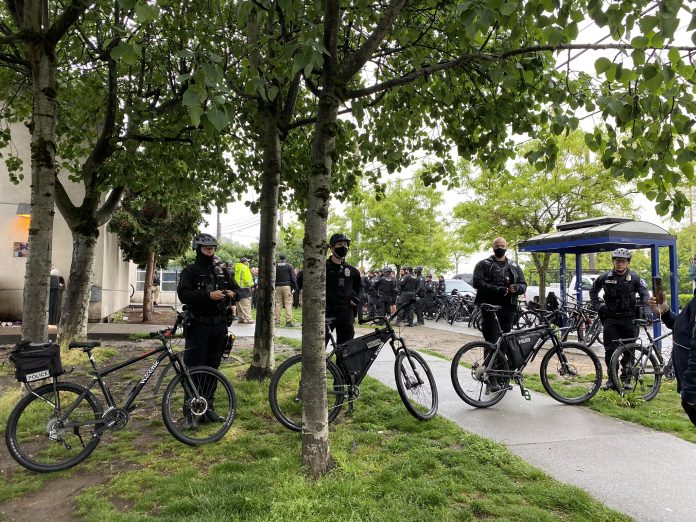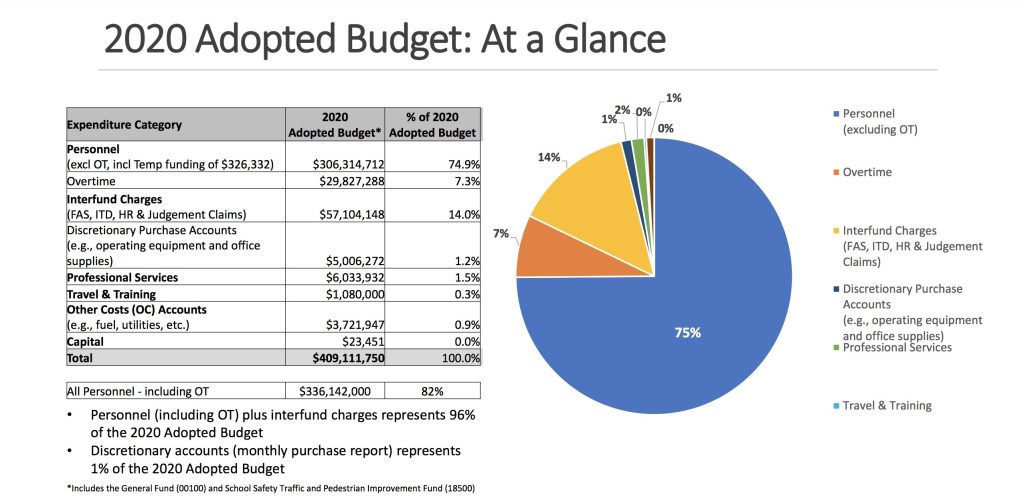
Mayor Jenny Durkan held another press conference on Tuesday to criticize Seattle City Council and their efforts to defund police by 50% and reallocate funding to community-led public health and safety. The Mayor, and Police Chief Carmen Best argued that any police officer layoffs whatsoever would be ill-advised and basically impossible.
Council President M. Lorena González responded with sharp words of her own during budget committee today.
“The mayor is spreading misinformation and fear… to undermine our collective efforts on the council,” González said. “She’s hoping efforts to defund and demilitarize the police will blow over.”
Cyclical Arguments
While we’ve all been through this back-and-forth before and it’s beginning to feel like a cyclical argument, I’ll summarize the case once more before moving to possible ways out of this policy deadlock. Options include removing Mayor Durkan and replacing her with a pro-defund mayor, laying off all officers and forcing them to reapply for their jobs, blocking a police contract unless it includes the ability to fire officers with documented excessive force and misconduct, or all of the above.
The Seattle Police Department (SPD) has about 1,400 sworn officers and an approved budget of $409 million before the rebalancing package–nearly 30% of the City’s general fund. A grassroots campaign led by coalitions such as Decriminalize Seattle and King County Equity Now has pressed for a 50% cut to that budget as soon as possible and seven of nine Seattle City Councilmembers have signed on. Only Alex Pedersen and Debora Juarez have refused to sign.

Protesters have been in the streets every day since George Floyd was murdered, and supporters have dominated public comment during budget hearings. This sustained public pressure is unprecedented in recent history and it appears to be over the public in Seattle.
Despite the Mayor’s efforts to brand the effort a fringe movement of radicals, recent polling has suggested a majority of Seattle voters support defunding SPD and shifting resources toward community-led health and safety. An EMC Research poll found the margin was 53% support to 45% opposition toward the proposal to “permanently cut the Seattle Police Department’s budget by 50% and shift that money to social services and community-based programs.”
Facing that pressure, the Mayor and Chief say SPD is doing such a great job that it’s widely cited as a national leader. They argue proposed funding cuts would undermine reform initiatives they portray as successful and cite racial bias training as an example–notwithstanding no data to support their efficacy of that training. Despite more than two months of violent police clashes with protesters with videos showing clear evidence of excessive police force, the Mayor and Chief have revealed no disciplinary measures against officers. They’ve only said that investigations are ongoing and the Office of Police Accountability is working on it.
In contrast, the City Council contends existing SPD reform efforts are wholly inadequate, citing police brutality and the lack of deescalation during the protests as proof of that. Sending officers, particularly armed officers, into too many situations and overpolicing communities of color are root problems for the Defund side.
Reducing the number of police officers is a net positive, particularly when funding is then funneled into social services that serve disadvantaged communities and a punitive approach is replaced with restorative justice and investment in disadvantaged communities.
Weeks of public discourse between the Mayor and Council have echo these points. Instead of getting bogged down in the intrigue and repeated arguments, let’s look at some possible ways out of this impasse.
Idea 1: Remove Mayor Durkan, Appoint Pro-Defund Mayor
Impeaching and removing the Mayor has been floating around as an idea since police crackdowns on protesters began. It’s gained powerful backers in the 36th District Democrats, 37th District Democrats, and 43rd District Democrats. A Change.org recall Durkan petition has surpassed 42,000 signatures.
Some have cautioned that removing Durkan could be a distraction. However, as the Mayor continues to wage a misinformation campaign against defunding and threatens use of her veto power–as she did earlier this week to impede a Covid relief package–it’s becoming clearer the 50% defund goal is impossible under the Durkan administration.
The problem is what comes next after the Mayor is removed. A leader would need to step forward with a plan to bring a defiant police department to heel and keep the Defund coalition together and overcome pushback while it’s being implementing. This might mean replacing Chief Best despite her remaining fairly popular in public opinion polls despite all the department’s recent shenanigans. Perhaps a firmer mayor could get Chief Best to cooperate–not to mention negotiate a much better contract with the police guild that leaves avenues for downsizing and weeding out bad cops open. In other words, it’s not an easy job.
Idea 2: Lay Off Everyone, Rehire ‘Good Cops’
Last in, first out tradition at the Public Safety Civil Service Commission, which governs firing decisions, complicates weeding out officers with a record of misconduct and makes it all but impossible without a cooperative police chief–which we don’t have. One idea to work around that problem is to fire everyone and then rehire the officers with clean records and a commitment to deescalation–but the Chief again would ultimately make the call. Obviously, the police guild would hate this and seek to whip up a public backlash and stoke fears of a crime wave. To avoid this, it’d have to be a carefully orchestrated plan.
The layoffs and rehires would have to happen on a rolling basis to provide continuity of service for core police functions like investigating violent crime and theft. Supporters would have to lay out a clear vision to overcome pushback and counter false claims that crime is increasing.
Based on how they’ve reacted thus far, it’s likely the police guild won’t just work the media–conservative-leaning media have been all too willing to broadcast their claims without fact-checking. They’ll also try to fabricate stories, such as when a shattered candle becomes an “improvised explosive device.” Facing large-scale layoffs, the police guild may well order work slowdowns or stoppages rather than cooperate with a plan that cuts their ranks.
The City would be walking a tight-rope, but the police guild might end up further tarnishing their image if they stand in the way of the restructure plan.
Option 3: Block Contract Unless Firing Bad Cops Is Made Easy
The police contract is due for renegotiation and renewal at the end of 2020. The last negotiation in 2018 was a trainwreck negotiated in secrecy that stripped out recently added accountability measures. Only one councilmember–Kshama Sawant–voted against the contract. However, there’s many reasons to hope this time will be different.
The politically powerful MLK County Labor Council expelled the Seattle Police Officers Guild (SPOG) from its ranks in June. Ongoing protests have put the issue of police accountability front and center, and the Seattle City Council has shifted to the Left. Two councilmembers that tended to side with police and not rocking the boat–Bruce Harrell and Sally Bagshaw–have retired and more stridently progressive members in Tammy Morales and Andrew Lewis have replaced them. If Mayor Durkan seeks to fold to police demands like last time, that may be the final straw in City Council removing her.
That’s not to say it will be easy. Police will seek to split the labor movement by making it a collective bargaining rights issue. Advocates will need to make clear they are not setting a precedent for all union negotiations by emphasizing that police guilds are unique: police are given the license to kill and then bargain for near impunity from consequences, unlike any other union.
The police may simply refuse to sign the contract. Without a contract, the City should seek to proceed with the officer reductions targeted at the worst offenders. If police are able to block firings even with an expired contract, it makes the mass firing and partial rehire route seem more necessary. Defund advocates could use a good lawyer to walk us through the finer points of police contract negotiations and what happens when police are working without an active contract–it may just default to the terms of the old contract. But roughly speaking, the deck is stacked against us for now, and we may actually need to change state labor laws to strip out anti-accountability measures for police.
What’s Next
More options exist than these three, but it roughly seems like where we’re headed based on our current trajectory and they offer ways to make 50% a reality. Another route: Minneapolis City Council has vowed to abolish their current police department and rebuild it from the ground up, similar to the mass firing and rehire option. FOr middle ground folks, abolish could be seen as scarier language than defund, but a completely new structure could be enticing considering the entrenched complacency and casual violence of the existing one.
In the short term, the existing union contract will make rapid layoffs challenging as the City Council grapples with changes. Councilmember Sawant has argued they should just reduce the remaining unspent 2020 police budget by 50%, which amounts to a $85 million cut, whatever the fallout may be. Her colleagues seem to prefer a more cautious approach to avoid running afoul of the SPOG’s contract or labor laws more broadly and overspending funds–should the reallocated money be unrecoverable due to layoffs being delayed by appeals or legal wrangling.
The short-term disagreement may make it harder to keep the Defund movement united and focused on the long-term goals, but hopefully everyone can make peace with the compromise and turn their united energies toward the next budget fight and the more equitable public safety system that comes next.
The featured image is by Enrico Doan.
Update: This article has been updated to note last in, first out isn’t in SPOG’s contract. It’s a guideline of the Public Safety Civil Service Commission with a big loophole for the Police Chief to go out of order “in the interest of efficient operation of his or her department.”
Doug Trumm is publisher of The Urbanist. An Urbanist writer since 2015, he dreams of pedestrian streets, bus lanes, and a mass-timber building spree to end our housing crisis. He graduated from the Evans School of Public Policy and Governance at the University of Washington in 2019. He lives in Seattle's Fremont neighborhood and loves to explore the city by foot and by bike.

